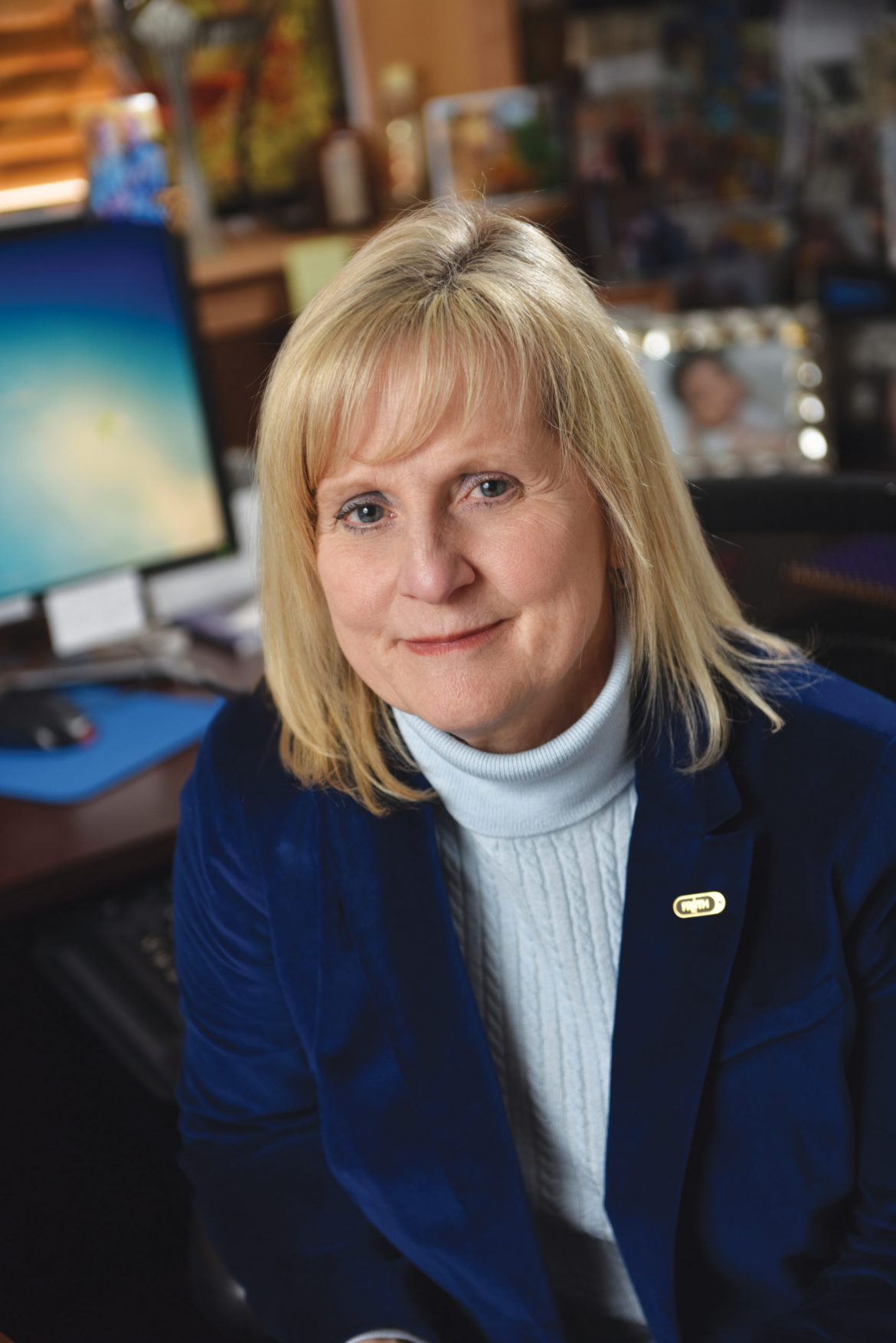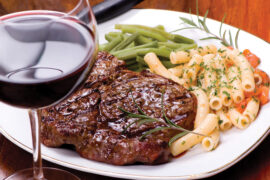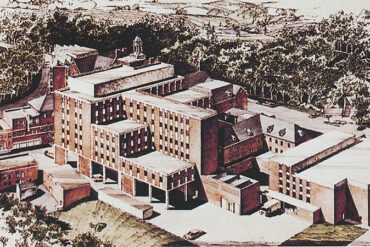Six years ago, she took charge of the floundering family business. Today, Fruth Pharmacy is stronger than ever and holding its own against the powerful big-box stores.
Interview by Jack Houvouras
HQ 96 | WINTER 2017
To Lynne Fruth, there’s only one way to tackle a challenge: head on. The Point Pleasant native graduated from WVU in 1980 with an education degree and chose to devote her teaching career to children with developmental and behavioral disorders. She earned a master’s degree in education from Marshall in 1995 and soon began helping other teachers find ways to reach struggling students, a passion that morphed into a career as an educational consultant. For close to 15 years, she helped school districts identify problems, and then she helped them fix them. In 2005, her father, Jack Fruth, the revered businessman and civic leader who started Fruth Pharmacy, died suddenly at the age of 77. Not long after, Lynne Fruth was faced with a challenge that would permanently alter her life. In May 2009, she was elected chairman of Fruth Pharmacy Inc. Leaving behind her successful career for 12-hour workdays and a company that had lost its momentum with the death of its founder, Lynne did what she does best: She pinpointed the problems, and she got to work repairing them.
That summer, she visited every Fruth Pharmacy and met with each location’s pharmacist and manager. Guided by her father’s values and vision, she took the company from a significant deficit to a profitable year-end in less than three years.
Even while overcoming challenges within the company, Lynne remained hyperaware of the challenges facing her community at large. She saw children in poverty unable to afford vitamins. She saw those same children and others having trouble paying for college. Most glaringly, she saw the drug epidemic infiltrating our region. She asked herself, “What can I do to help?”
The answer, it turns out, was a lot. Fruth Pharmacy led West Virginia’s fight against methamphetamine production by being the first pharmacy chain to remove single-ingredient pseudoephedrine from its shelves in 2013. In 2015, the pharmacy donated 13,500 syringes to start Huntington’s syringe exchange program and has since donated over 100,000 syringes to health departments across the Tri-State. Fruth Pharmacy offers a free vitamin program for low-income children, and every year the Fruth Scholarship program gives approximately $50,000 in college scholarships to 40 local students. In 2016, Fruth launched a scholarship program at Recovery Point of Huntington, helping graduates of the program pursue higher education or vocational training.
Huntington Quarterly Editor Jack Houvouras sat down with Lynne in November for an hour-long conversation about her upbringing, her passion for education, the challenges of working in an industry dominated by men and why she believes a truly successful business is one that gives back.
What was it like growing up in Point Pleasant?
You know, honestly, I tell people I had a perfect childhood. Where I grew up you could bounce a ball three times and a crowd of 20 kids would show up in no time. Point Pleasant was a very close-knit community. My dad had the pharmacy, and he would work seven days a week. So, we spent a lot of time at the store. We’d get a drink at the soda fountain, read comic books and visit him and our grandmother. It was a great place to grow up.
What were your parents like?
I only got spanked twice in my life. You didn’t want to disappoint my dad. Both parents instilled in us the belief that you can be anything you want if you’re willing to put in the work to get there. So, I feel like we were all empowered. My dad was a lot of fun. He would go sled riding with us, ice skating, fishing. One of my fondest memories was going down to the Old Town River with bamboo poles when I was 5 or 6. I hooked a fish that, to this day, is the biggest fish I’ve ever caught – it was as big as a milk jug! I was envisioning taking this fish home and showing all the neighbors when all of a sudden it flopped back into the water. I started crying and Dad said, “Now, Lynne, that was probably the granddaddy of all the fish in this river. It probably needs to be here.” That somehow made me feel better.
Your father was a highly respected businessman and civic leader. What did you learn from him?
Dad had a number of sayings that have stuck with me: “Nobody ever got ahead by working 40 hours a week.” “Always do the right thing. A good deal needs to be a good deal for everybody.” He was very fair, and he had great business acumen. He just had the gift of knowing how to make money. He was part owner in a lot of little businesses. He helped grow Peoples Bank, which later was acquired by City National Bank. I think his greatest passion was to try to make the community stronger and grow more jobs. He liked helping people have more opportunities. He used to say that children learn how to be giving people by watching their parents. All five of us saw him give back. After he died, I was cleaning out his desk when I found something at the back of the drawer – it was a stack of letters from dozens and dozens of people that he helped. He did a lot of public giving, but there was also a lot behind the scenes. I read letters from people whose house had burned down or who had declared bankruptcy. There was one man’s father who was in Costa Rica who hit his head and was in critical condition. He eventually recovered but was told he couldn’t leave Costa Rica until his $100,000 hospital bill was paid. So, my father paid the bill and had him flown back to the United States. My family published a book about our dad called A Journey of Giving. It tells many of these types of stories. Today, Point Pleasant and the state of West Virginia are better because Jack Fruth lived here.
What were some of your first jobs after studying at West Virginia University and Marshall University?
My ex-husband and I had a small vending business, but I pretty much worked in the educational field.
I taught in Jackson County. I taught gifted students and later was asked to help teach some of the struggling students – the learning disabled, the autistic, the kids with tough backgrounds. After a year, I decided that special education was my calling. It was very hard work because, sometimes, the progress you see is imperceptible-but eventually, there will be a breakthrough. I remember one student I’d worked with for five years trying to teach him to read. One day, he read a story to me, and I jumped up and said, “Parker, you can read!” It was at that moment that I knew he was going to be all right, and that is a very satisfying feeling. Today, I see many of my former students working. I visited with a student working at Home Depot and another at a drive-thru restaurant. It’s rewarding to know that they have found work and are contributing members of society.
You were recognized for your innovative work with students with learning disabilities and were asked to consult with troubled school districts throughout West Virginia. Tell us about that.
I studied the pioneering work of Dr. Ron Wolf, who is currently a professor of special education at Marshall University, and started putting his lessons into practice.
I started having phenomenal results with my own students. After that, the state of West Virginia asked me to travel to Wheeling and Moundsville to show the teachers there what we were doing. After those schools had such great success, the West Virginia Department of Education decided to fund a grant that enabled us to reach another 15 to 20 schools.
Why did you decide to go into the family business?
Oh, boy! That was never planned. My father died suddenly, and there was a succession plan in place. A few years after he died, I came to the office to go through some of his stuff, and while I was here I just listened to people. Then, I started asking questions. At the time, we thought everything was fine, but it wasn’t. There had been an economic downturn in 2008, and I think there was a little bit of a crisis of leadership. I think there was some complacency. So, I decided to look over all the financials, which took six months. It became obvious to me that the company was very much at risk. At the time I realized we had to do something, but I had no plans of getting involved in the business myself. I talked to my mom and family and convinced them that we needed to assert our ownership – the family owns 65 percent of the stock. We did that, which was very difficult. The next question was, “Who is going to be chairman of the board?” I wanted it to be my cousin, who is a CPA, but he wasn’t interested. Ultimately, the decision was left to my mother who had two choices – me or my youngest brother. My mom said, “It has to be Lynne because John is too nice.” [Laughs] I tell everybody that my mom thinks I’m the meanest kid, and that’s how I got the job.
What are some of the challenges of running a company with 700 employees in three states?
[Pauses] You know, there is always something coming apart. It could be an employee’s personal tragedy – this week, for example, we have an 80-year-old employee who is having brain surgery, and I have to make sure to be there for that, and there’s a funeral I need to attend for an employee whose mother died. Sometimes, I will get a text at 10 p.m. that someone has broken into one of our stores to steal drugs or that a car has hit a telephone pole that fell onto one of our stores. There are regulatory compliance issues, fraudulent prescriptions, robberies. It’s constant. There’s never a time when everything is just fine. So, you’re doing all that and trying to provide great customer service. It’s hard work.
How do you compete with the big-box store pharmacies like Walmart, CVS and Walgreens? Do any of them want to gobble you up?
Do they want to gobble you up? Absolutely. I think that’s the trend in the business world today – private equity firms with lots of cash are looking to buy businesses. The bigger question is, “How do you compete?” I think people like doing business with local companies.
I think people are choosing to have a personal relationship with their pharmacist. Oftentimes, people have a more significant relationship with their pharmacist than their doctor. We have pharmacists who have been with us for 10 to 20 years. We have a lot of older employees. We have a couple of delivery guys in their 70s. In an age when everyone wants to hire younger, cheaper help, we have embraced what the older workforce can bring. We offer a level of service that you just can’t find at a cold, big-box store. It involves everything from having the same checkout person every time you come to the store to putting in that extra effort to make our customers happy. If a customer comes in and asks, “I’ve looked at seven different stores for this skin lotion. Can you find it for me?” Our answer is always, “Yes.”
Your father was well known for giving back to the community in numerous ways. Likewise, you have carried on that tradition the last six years. What are some of the ways that Fruth tries to make West Virginia a better place to live and work?
My dad always said that if you want to change a community, help educate the young people there. After my parents had raised the five of us, they established scholarship programs at Marshall University, West Virginia University, University of Charleston, Rio Grande, Ohio State, Ohio University Southern and several other institutions. Most recently, we established four scholarships for some of the graduates at Recovery Point (a drug recovery program in Huntington). So, education is our primary mission in giving, and we try to focus on first-generation college students and at-need students. This year at Marshall we have 10 Fruth employee scholarships that are in place specifically for employees, their children or their grandchildren. Those scholarships are probably the most meaningful to me. We currently sponsor 40 scholarships. In addition to education, every year we require our stores to sponsor at least three events that are a benefit to the community. It could be a road race for cancer awareness, health screenings, pet adoptions, help for needy mothers or a fundraiser for a local high school. Anything, really. I like to say, “When the big-box stores take over and all the small businesses are gone, who’s going to pay for the new uniforms for the high school band? Who’s going to buy the animals at the county fair? Who’s going to help send local kids to college? I’ll tell you who – nobody.”
We just had a presidential election where a woman almost broke the ultimate glass ceiling. What have been some of your biggest challenges in a business world that is still mostly dominated by men?
Well, when you look at the pharmacy industry it’s not “mostly.” It’s almost entirely dominated by men. But, it hasn’t been hard for me. I grew up a tomboy. I played sports, and I got along better with the boys. My best friends were all boys. My industry is 95-percent male. There are only two women on the board of the National Association of Chain Drug Stores. I will hear a condescending remark about women every now and then, but I’ve yet to meet anyone I can’t hold my own with. [Smiles] There’s a joke at these meetings about me. They say, “Lynne is like a Marine. She’s either your best friend or your worst enemy.” I think I’ve earned their respect because I am a straightforward, no-nonsense businessperson.
What is your take on the drug epidemic in Appalachia? First it was crystal meth, then prescription painkillers and now heroin. Why is this happening to our people?
Let me start by addressing the crystal meth problem. When this street drug was at its peak, one of our pharmacists, Tim Weber, came to me and said, “There’s a new product coming out that is a pseudoephedrine that is tamper-resistant.” We talked about bringing that product in and taking out all the single-ingredient Sudafed. Tim made the point that we could really change what’s going on in West Virginia. So, we studied the problem and found out that we would lose 20 percent of our business. But I decided that I was OK with that because that’s the business we shouldn’t be doing anyway. We became the first chain to get rid of single-ingredient Sudafed. Once we did that, it really took off. I wasn’t prepared for the amount of publicity we received – it was shocking, and it really lit a fire. A year later Rite Aid’s vice president called me and decided to implement our program in their West Virginia stores. After that, we started talking to CVS, Walgreens and the other chains. The latest statistic I heard was that the program had reduced meth labs by 60 percent. There’s still crystal meth out there, but you do not have the production of meth in these households that put children and families at risk. You don’t have the production of meth damaging property and putting our law enforcement officers in harm’s way. What that taught me is that one little drug store chain can make a difference. As for the opioids, the prescription painkillers, they are a highly addictive class of drugs. I think the problem started because painkillers were being overprescribed. It affected people from every walk of life – doctors, lawyers, teachers – and they ended up going down a terrible path. Many of them were given prescriptions for chronic pain or injuries, and I think some became inadvertently addicted. The DEA and the health care industry eventually figured out that this class of drugs was too addictive and made the necessary changes to limit their use. Once that happened, it became much harder to get a prescription, so people turned to heroin. Then you started seeing a lot more overdoses. To help combat this we educated ourselves about Naloxone (an emergency medication used to counter the effects of opioids, specifically in cases of overdose) and trained our pharmacists on how to counsel and dispense this lifesaving medication. We met with former Gov. Tomblin on how to put new laws into place. We got on board early. As for why anyone would ever do these drugs recreationally, I just don’t have an answer. I don’t know why any sane person would choose to go down that dark path.
You’ve traveled a lot throughout the state and region. What sets Huntington apart from how it handles the drug epidemic?
Huntington is fabulous. It is a poster child of what communities should be doing to combat the drug epidemic. I have seen everyone get involved – Mayor Williams, City Council, first responders, the business community, the health care community, law enforcement, churches. There wasn’t anybody who wasn’t walking in the same direction. It really is amazing. Where have you ever seen a community where you can get everybody to buy in? It’s extremely rare. I think a lot of the credit goes to the mayor for laying the groundwork, having the meetings and educating people. I hold Huntington up as an example of what can be accomplished when everyone works together.
What led you to include Recovery Point of Huntington as part of your legacy of giving back?
I think most families have been touched by substance abuse. I went to a town hall meeting about the drug epidemic, and a young man named Matt Boggs stood up and talked about Recovery Point. I was so impressed with him that I asked to meet him. He invited me to tour the facility, which was remarkable. I’ve always felt that what most people need in life is a sense of hope, and that is particularly true with people in recovery. What better way to create that hope than to offer people who complete the program a scholarship to assist them in their next step – to help them have a viable career and a better life? Our scholarships are for community college, trade school or college. I’ve been to Recovery Point several times; and inevitably, I run into someone I know whose life was a mess but is now headed in the right direction.
Where do you see yourself, Fruth Pharmacy and the state of West Virginia in the next 20 years?
My husband will probably kill me for saying this, but I’ll probably still be working. [Laughs] My parents never retired. My dad worked on a Friday, went to a meeting on Saturday, got sick on Sunday and died on Tuesday. I never saw anyone on the Fruth side of the family retire. It’s kind of crazy. If you’re doing something really meaningful then it doesn’t really feel like work. As for the company, we went from 25 stores when I started to 30 stores today. We have done three small-format stores – basically a store within a store. We now have seven retail clinics, and we have partnered with hospitals and health care providers to have an urgent care-type clinic in some of our stores. You know, I have a lot of faith in West Virginia. I’ve been able to attract a lot of talent from bigger cities around the country. I’ve been able to attract a lot of great, young talent to come and work in West Virginia. How? Because West Virginia is a great place to live. It’s friendly. There’s a sense of community. It’s still the kind of place that if your child is walking home from soccer practice someone will stop, roll down their window and say, “Hey Michael, do you need a ride home?” I think of the positive qualities we saw after the floods last year – there’s nobody that takes care of their own like West Virginians. As West Virginians, we don’t give so much out of our abundance, but we give out of what little bit we have. And that’s one of the things that make it a great place to live. I hope we can get some different industries started. Completing Route 35 is going to be huge for economic development in the state. That’s something my dad and Charles Lanham worked on for 35-40 years. In the final analysis, we have a very resilient people who live here. They have a tremendous connection to the land and possess a strong devotion to want to stay here.





